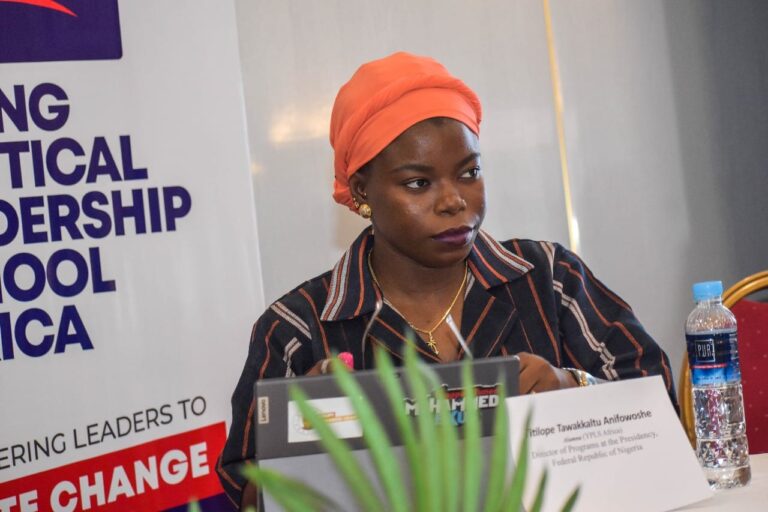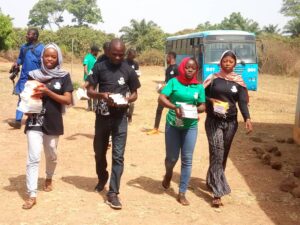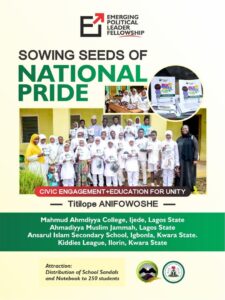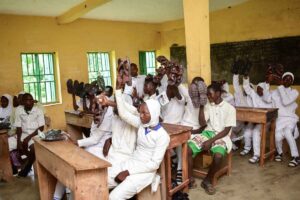In a nation whose sociopolitical terrain is often described as turbulent, complex, and deeply layered, rising through the ranks requires not only ambition but an unrelenting commitment to service, ethics, and transformative ideals. Few individuals embody this rare combination more distinctly than Barrister Titilope Tawakkaltu Anifowoshe. Her story, however, is not merely that of personal accomplishment, it is one of service, advocacy, values-driven leadership, and a unique capacity to mobilize thought and action for community transformation. Her journey, woven through the worlds of law, civic engagement, youth development, and political reform, offers deep lessons for Nigeria and the wider global south.
Barrister Titilope Anifowoshe’s emergence onto Nigeria’s leadership stage reflects a well-calibrated balance between intellect and empathy, ambition and purpose, voice and action. In a time when the term “youth inclusion” is often reduced to tokenism, she has proven through consistent work that young people can not only be part of the national conversation but also shape it.
From her formative years, Anifowoshe was no stranger to leadership. What set her apart even then was not just a passion for civic involvement, but the clarity of her purpose: to become a bridge between marginalized communities and structures of power. Her academic path, which included legal training at the University of Ilorin and subsequent bar qualification at the Nigerian Law School, set a strong intellectual foundation for what would become a multi-sectoral career marked by impact.
However, rather than taking the conventional legal route, she broadened her expertise through a Mini-MBA in Nonprofit Leadership at Lagos Business School, and a dual postgraduate journey in Information Management and NGO Administration. These qualifications, while impressive on paper, translated meaningfully into the field, forming the backbone of her practical approach to community development and nonprofit management.
In 2015, at just 20 years of age, Anifowoshe founded the Eagles Foundation for Humanity (EFFH). Initially a modest student-led initiative, EFFH has grown to become one of Kwara State’s most influential youth-run development organizations. It has mobilized over 200 volunteers, implemented projects across multiple states in Nigeria, and has been instrumental in providing access to clean water, menstrual hygiene products, assistive devices for visually impaired students, and educational resources to underserved communities.
The ethos behind EFFH’s work reflects Anifowoshe’s approach to leadership one rooted in listening to the needs of the community, building sustainable interventions, and empowering others to lead. She is not a savior; she is a facilitator. Her leadership at EFFH reflects a deliberate departure from charity to dignity-based development. Perhaps more significantly, she resigned from her executive position in the organization not because of scandal or burnout, but as a deliberate choice to allow institutional growth and continuity. That decision itself is rare and commendable in Nigeria’s nonprofit landscape, where founder dependency remains a key challenge.
While many activists shy away from formal politics, and many politicians abandon activism upon assuming office, Anifowoshe embodies a rare synthesis of both. Her political engagements, from being the youngest information officer of the All Progressives Congress (APC) to serving in advisory roles in the federal government, demonstrate that youth involvement in politics does not have to be cosmetic. It can be strategic, value-laden, and reformist.
Her role as Executive Assistant and Director of Programmes at the Office of the Senior Special Assistant to the President on Citizenship and Leadership has offered her a platform to translate advocacy into governance. But it is not her position that defines her political ethos, it is her principles. In a courageous and principled move, she once resigned from a ministerial aide position in solidarity with the youth-led #EndSARS movement. In a country where sycophancy often trumps ethics, this decision marked her out as a political actor with deep convictions.
Furthermore, her inclusion on the Technical Advisory Council of the Emerging Political Leaders Fellowship (EPLF) Nigeria’s most rigorous nonpartisan political fellowship, positions her not just as a practitioner of politics but as a shaper of the next generation of leaders.
One of Anifowoshe’s most potent tools is her voice. Whether speaking at conferences, writing for national newspapers, or podcasting, she has shown that intellectualism and activism are not mutually exclusive. Her opinion pieces have tackled sensitive topics, from the ethical dilemmas in governance to the gendered dimensions of power in Nigerian society. Her views are frequently anchored in evidence and often push the boundaries of public discourse in refreshing ways.
Her book, Unleashed Dreams: A Thorny Journey to Tranquility, is both a personal narrative and a guidebook for young people navigating Nigeria’s often disillusioning sociopolitical terrain. In it, she speaks to her experiences with candor, offering not just lessons but tools for resilience, growth, and self-leadership.
Barrister Titilope Anifowoshe’s career has consistently centered marginalized voices, particularly women and young people. Her advocacy for women’s inclusion in leadership is neither abstract nor theoretical; she has engaged directly with party structures, community groups, and governance institutions to challenge the systemic barriers that exclude women from power.
Her leadership is intersectional not only is she concerned with who is at the table, but also with how power is distributed, how policies are framed, and how leadership is practiced. She is not content with visibility; she demands voice, representation, and influence.
It is not surprising, then, that she has been repeatedly honored, not just by local groups but by national and international bodies. From the Royal African Young Leadership Forum (convened by the Ooni of Ife) to awards from WFD UKAid and Opportunity Hub, her work has been acknowledged across spheres of influence.
In an age of performative activism and short-lived social fame, Anifowoshe has maintained a long-game view of change. Her emphasis on institutional growth, ethical leadership, and informed governance reflects a vision that goes beyond the now. She understands the importance of systems legal systems, political systems, development systems and works daily to either reform or strengthen them.
She is also investing in the future by mentoring young professionals, shaping thought through strategic communications, and building bridges between the nonprofit, public, and political sectors. Her goal is clear: to raise a generation of value-driven leaders who will not just occupy office but will redefine its purpose.
Barrister Titilope Anifowoshe is not merely a role model, she is a case study in how principled leadership, when combined with intellectual rigor and strategic engagement, can create sustainable change. Her story is not just to be admired but to be studied, replicated, and expanded. As Nigeria continues to search for authentic leadership, her life and work offer a clear example of what is possible when courage meets competence.
References
1. Emerging Political Leaders Fellowship (EPLF) – Participant and Advisory Profiles.
2. Premium Times Opinion Article by Titilope Anifowoshe. “What Kamala Harris’ Speech Teaches Nigerian Politicians.”
3. Amazon. Unleashed Dreams: A Thorny Journey to Tranquility by Titilope Anifowoshe.
4. The Nation Newspaper. “26-Year-Old Kwara-Born Lawyer Honoured in Leadership Circle.”
5. JustEventOnline. “Barrister Titilope Resigns from Eagles Foundation.” Retrieved from:
6. ThisDayLive. “SSA to the President Appoints Youth-Led Team.”
7. Apple Podcasts. “Titilope Anifowoshe Podcast on NGO Leadership.”
Source: Trove Online Media





